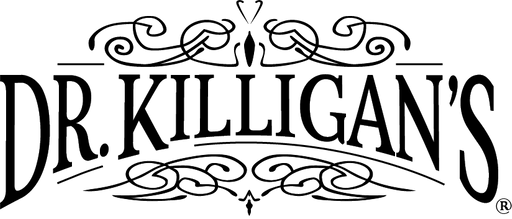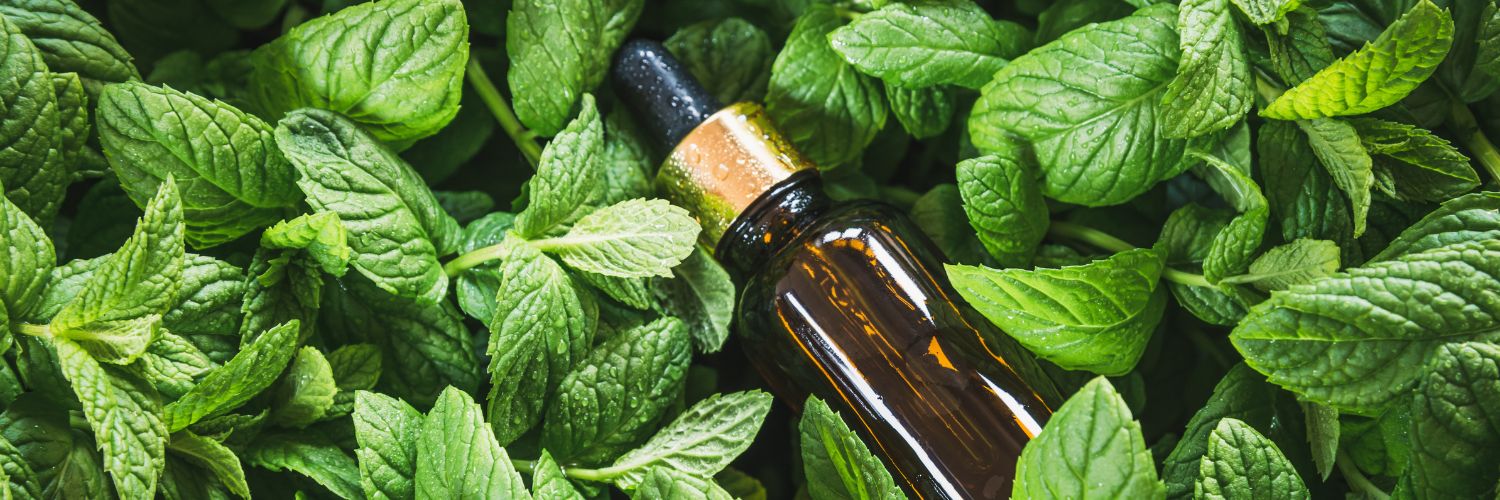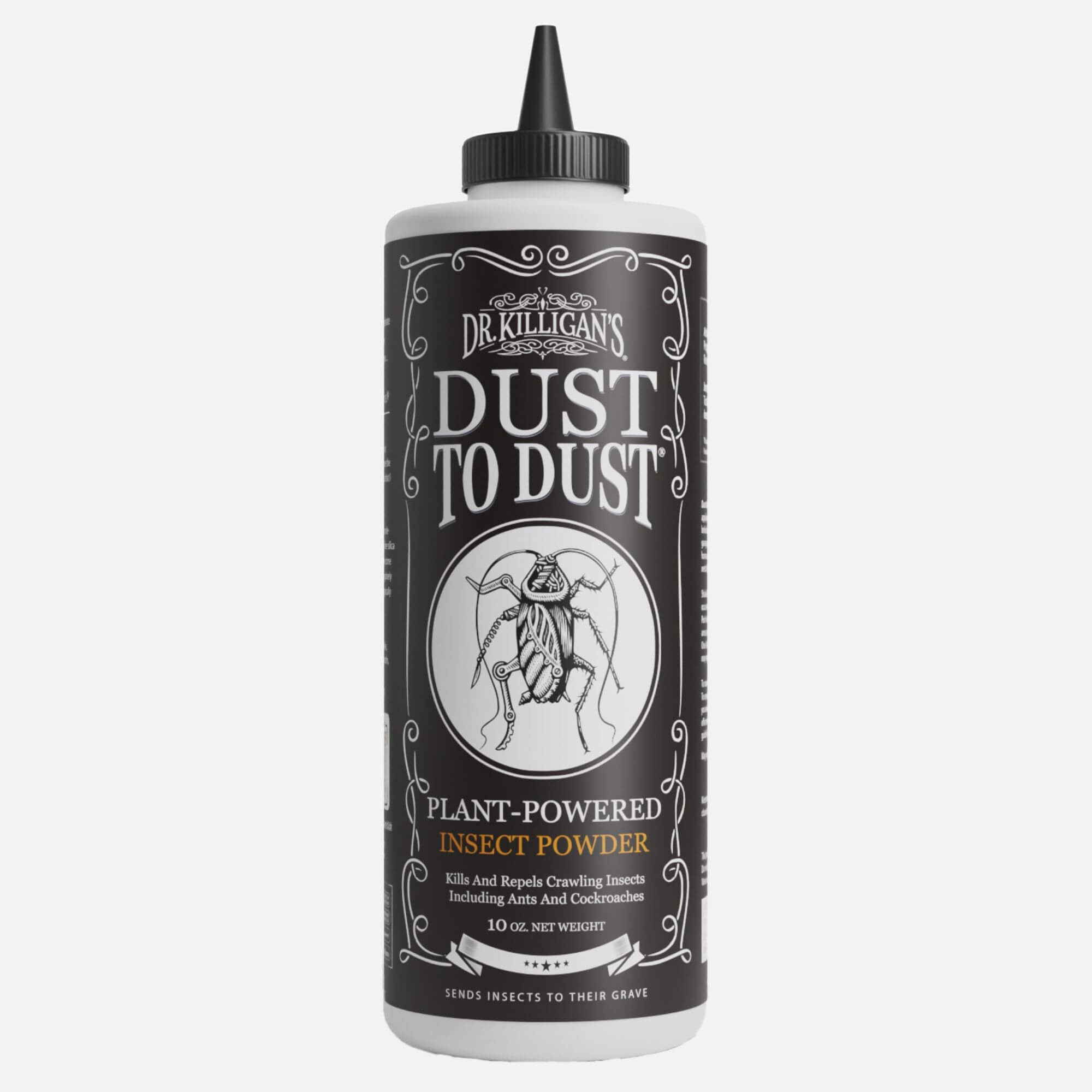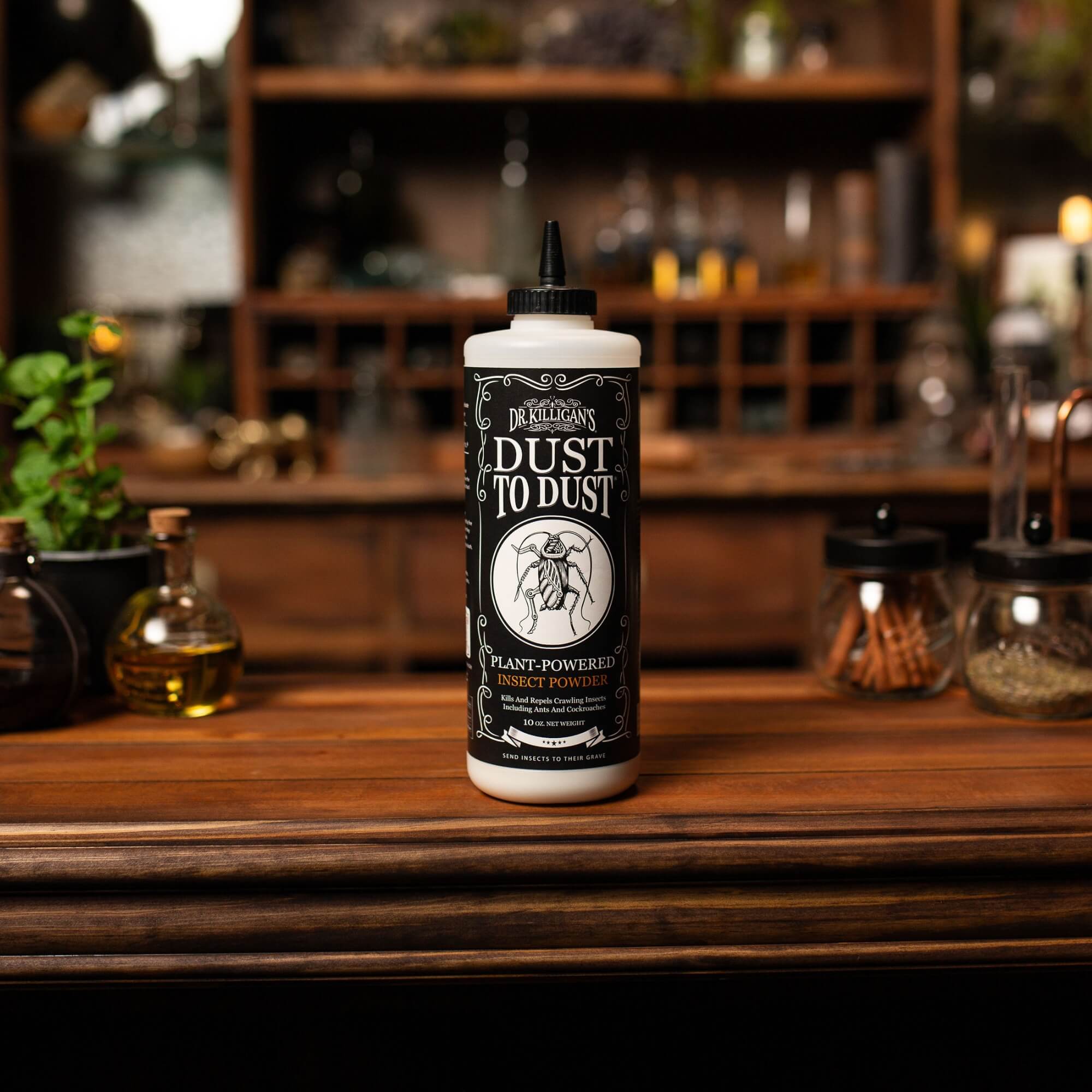Updated on July 5th, 2025
Essential oils have been valued for thousands of years for their healing and aromatic properties. Ancient civilizations like Egypt used them in embalming and religious rituals, while traditional Chinese and Ayurvedic medicine applied essential oils to treat physical and emotional ailments.
Today, essential oils are experiencing a resurgence as natural, holistic solutions—for health, wellness and effective pest control. Peppermint oil, in particular, stands out for its versatile uses: from soothing sore muscles, relieving migraines and mixing up a minty cocktail to acting as a natural insecticide that helps keep pests at bay. Meanwhile, clove oil—a key ingredient in Dr. Killigan’s Six Feet Under—is celebrated for its oral health benefits, natural pain relief and powerful pest-repelling properties.
What are essential oils?

Essential oils are highly concentrated plant extracts obtained through distillation or cold pressing. They capture the plant’s natural scent and beneficial properties.
Inside parts of the plant—such as the bark, roots, leaves, seeds and flowers—are powerful compounds that retain the essence of their source. These components—called essential oils—vary in smell, absorption and effect depending on which part of the plant they’re extracted from.
There are dozens of essential oils, each offering unique benefits. In this article, we’ll focus on peppermint oil—a versatile and plant-powered oil that deserves a place in your wellness routine and pest control toolkit.
What is peppermint oil?
Peppermint is the fifth most produced essential oil in the world.
It is a highly aromatic essential oil derived from Mentha piperita, a natural hybrid of water mint (Mentha aquatica) and spearmint (Mentha spicata). Part of the Lamiaceae (mint) family, this powerful oil is best known for its fresh scent, cooling sensation and wide range of uses—from natural pest control to wellness remedies.
The two main active compounds in peppermint oil are menthol (about 41%) and menthone (about 23%). Menthol gives peppermint its familiar cooling effect, scent and taste. Menthone contributes to peppermint’s spasm-relieving properties, which may help ease cramping and digestive discomfort.

Though native to Europe and the Middle East, peppermint is now cultivated worldwide—especially in the United States, which produces over 4,000 tons annually and remains the world’s leading producer of peppermint oil.
Peppermint has a long history of use:
- In ancient Japan, mint was grown for its menthol and even piped into office air systems to boost productivity.
- In medieval Europe, monks used mint to polish their teeth.
- Today, it's prized globally for its versatility in healthy living, hygiene and natural pest control.
Where does peppermint get its name?
Peppermint is believed to have originated in Northern Africa or the Mediterranean region. Its name is rooted in Greek mythology: According to legend, Hades—the god of the underworld—fell in love with a beautiful nymph named Minthe. Enraged with jealousy, his wife Persephone transformed Minthe into a common plant that grew like a weed, often trampled underfoot. To soften this damage, Hades gave the plant a sweet, refreshing scent so her presence would never be forgotten.
Top 10 uses & benefits of peppermint oil (and how to use it)
The beneficial properties of peppermint oil—extracted from the leaves and flowering parts of the plant—are broad and versatile.
Backed by both scientific research and centuries of traditional use, peppermint oil offers powerful support for your health, wellness and home. Below are 10 of its most popular uses—plus how to apply them.
1. Muscle relief after physical activity
Apply topically to cool fatigued muscles and soothe minor aches. Dilute 1–2 drops in a carrier oil or lotion to avoid skin sensitivity.
2. Headache and migraine relief
Apply diluted peppermint oil—same dilution rate as above—to the temples and back of the neck to relieve tension and reduce discomfort.

3. Digestive support
Taken internally, peppermint oil promotes healthy bowel function, eases bloating and supports overall gastrointestinal comfort. Use a food-safe essential oil and consult a healthcare provider before ingesting.
Tip: Katie Wells of Wellness Mama shares a popular DIY digestion tincture that combines peppermint oil with ginger and fennel for natural relief.
4. Nasal decongestant and respiratory relief
Inhalation or diffusion may reduce nasal congestion, ease breathing and alleviate certain upper respiratory conditions.
Tip: Add a few drops to a diffuser or a bowl of steaming water, then inhale deeply for several minutes. You can also place a drop on a tissue and breathe in gently.
5. Oral health and fresh breath
When used in toothpaste or mouth rinses, peppermint oil’s antibacterial properties help fight the germs that cause plaque, bad breath and gum disease. According to OraWellness, it's particularly effective in reducing oral pathogens—especially those associated with periodontal conditions. Peppermint oil also helps manage the biofilm that P. gingivalis (a harmful bacteria) uses to grow and spread, making it a natural tool for supporting long-term oral hygiene.
Tip: OraWellness Healthy Mouth Blend features organic peppermint oil and other botanicals to naturally support oral health.
6. Relaxing foot soak
Add a few drops to warm water with one-half cup Epsom salt to soothe tired, aching feet after a long day.
7. Nausea and stomach discomfort
Peppermint oil is widely used to relieve nausea, including motion sickness, morning sickness and general stomach upset. Its soothing aroma works through inhalation, while internal use may help calm the digestive tract and reduce queasiness.
Tip: Dilute and apply to the wrists or temples for on-the-go aromatherapy. For digestive relief, take 1–2 drops in a vegetarian capsule—but only if using a food-grade oil and under professional guidance.

8. Antimicrobial action
Peppermint oil naturally kills or slows the growth of harmful microbes, including certain bacteria, mold and fungi. Studies show it’s particularly effective against E. coli and S. aureus—two common culprits behind foodborne illness and skin infections. By disrupting their ability to grow and spread, peppermint oil offers a safer, plant-based way to help protect your home and health.
Tip: For household surfaces, add a few drops to a spray bottle with water and white vinegar. For skin, dilute with a carrier oil before applying to minor cuts or irritated areas to reduce the risk of infection.
9. Aromatherapy and mental clarity
Diffuse to create a focused, energizing atmosphere—ideal for work, studying or boosting alertness.
Tip: Add 4–5 drops to a diffuser or a cotton ball placed near your workspace to boost concentration and uplift your mood.
10. Natural sleep aid
Peppermint tea (herbal, caffeine-free) can help you wind down and feel more relaxed before bed—especially if indigestion or tension are keeping you up. Enjoy a warm cup about an hour before sleep.
Why does Dr. Killigan’s use peppermint oil for pest control?

Peppermint oil isn’t just refreshing—it’s a powerful, plant-powered insect repellent. That’s why it’s one of the active ingredients in Dust to Dust, our all-natural, insect-killing powder designed to stop creepy crawlies in their tracks.
Unlike traditional pest control methods that rely on synthetic chemicals—many of which pose health and environmental risks—Dr. Killigan’s uses peppermint oil for pest control because it’s both effective and family-safe when used as directed. Our goal is to kill bugs, not compromise your well-being.
How peppermint oil works to repel bugs
Peppermint oil naturally repels and deters a wide range of pests, including:
- Ants
- Aphids
- Beetles
- Caterpillars
- Cockroaches
- Fleas
- Flies
- Lice
- Mosquitoes
- Moths
- Spiders
In fact, when threatened or crushed, the stink bug releases aromatic compounds from behind its head that smell like peppermint or cilantro—a natural defense to deter predators. (Cilantro, like peppermint, has a fresh, minty scent.)
The science behind peppermint’s pest-fighting power
Peppermint oil contains terpenes, alcohols and menthol, which act as natural fumigants. Insects and rodents' smell receptors pick up on and are repelled by these compounds, making your home an unwelcoming environment for pests. Research even shows that menthol can be as effective as DEET in repelling mosquitoes.
Additionally, peppermint oil exhibits biocidal properties, meaning it can:
- Kill microbes
- Deter pest infestations
- Interfere with insect nervous systems
- Prevent pests from breeding and spreading
Studies have shown peppermint oil can achieve up to 97.2% mortality in nymph populations and it’s also been proven effective against German and American cockroaches.
A safer, smarter solution for your family
Many conventional pest control products may kill bugs, but they also expose your household to toxic chemicals—sometimes causing lasting harm.
These toxins can enter your body through:
- Oral exposure—by ingesting contaminated air, food or drink
- Respiratory exposure—by inhaling vapors, droplets or powders
- Dermal exposure—through skin contact and absorption into the bloodstream

And over time, pests are adapting. Some insects are building resistance to traditional chemical treatments, making them less effective—and more dangerous as manufacturers increase potency to compensate.
At Dr. Killigan’s, we take the opposite approach. Our plant-based pest control products are designed to kill bugs while keeping your home safe from harmful ingredients.
Peppermint oil is one of nature’s most versatile defenders, and we're proud to use it in a way that aligns with our mission: Kill bugs. Not compromise.










